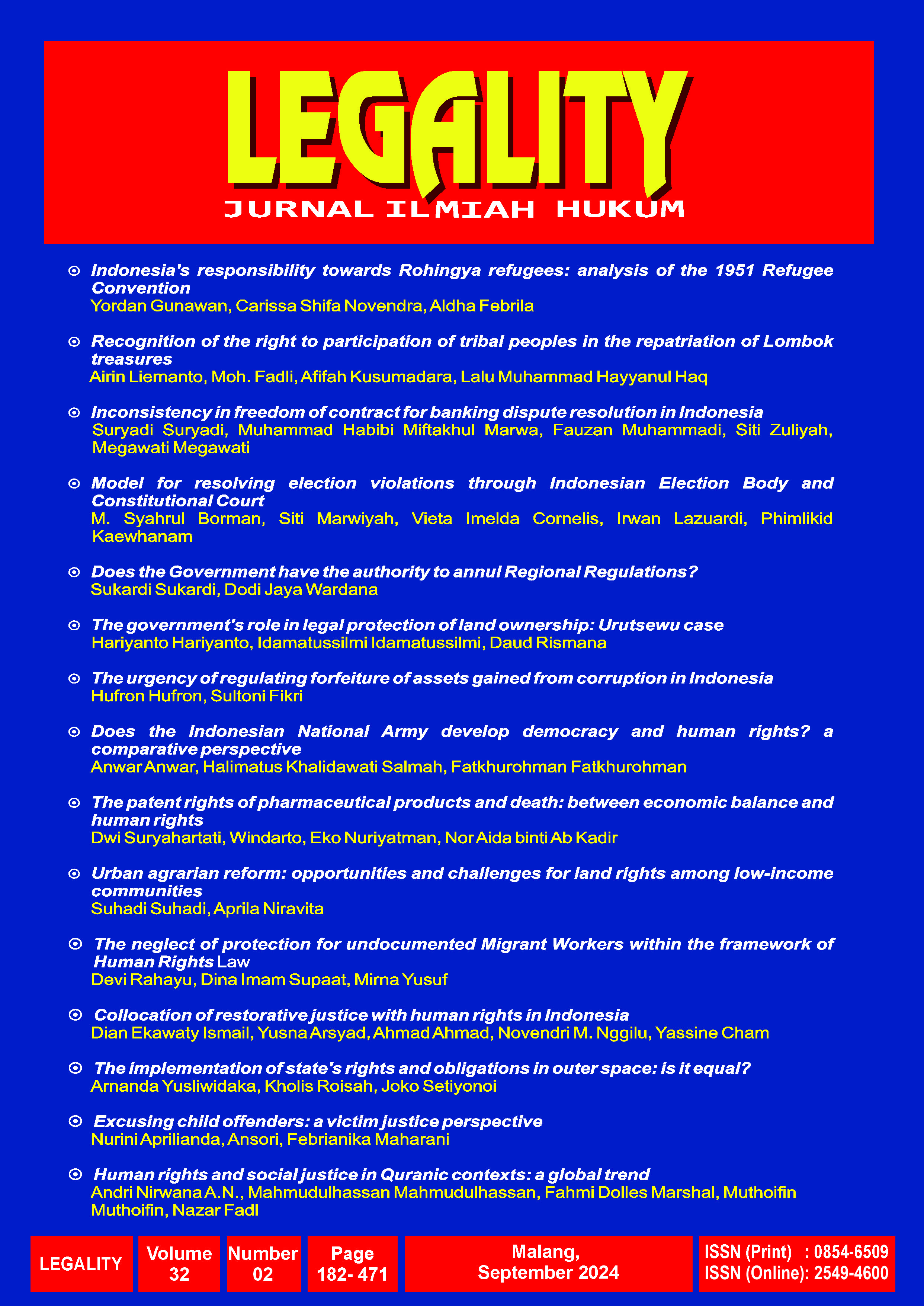Human rights and social justice in Quranic contexts: a global trend
DOI:
https://doi.org/10.22219/ljih.v32i2.35088Keywords:
Quran, Islamic Law, Islamic Jurisprudence, Bibliometric Analysis, Human RightsAbstract
Scholarly interest in the study of social justice and human rights in Quranic contexts has increased in light of global conversations about ethical governance, equality, and justice. To fully comprehend how Islamic texts contribute to current human rights discourses, this study aims to present a bibliometric analysis of key trends, authors, and themes in the literature surrounding these problems. Using R/R-Studio, Vosviewer, Microsoft Excel, and a Boolean search on Scopus, data from 2019 to 2024 is analysed to identify important trends, authors, affiliations, and thematic developments within these interconnected disciplines. The results show a wide range of research interests and substantial publication activity with noteworthy contributions from different nations and institutions. Network visualisations highlight the transdisciplinary nature of the discourse by illuminating the relationships and co-occurrences of important terms. This study offers important insights into the development of scholarly research on these important subjects, laying the groundwork for further research and educating practitioners and politicians on the relationship between social justice, legal doctrine, and religious texts.
Downloads
References
Abrahamian, E. (2023). Tortured confessions: Prisons and public recantations in modern Iran. Univ of California Press.
Aditya, Z. F., & Al-Fatih, S. (2021). Indonesian constitutional rights: expressing and purposing opinions on the internet. International Journal of Human Rights, 25(9), 1395–1419. https://doi.org/10.1080/13642987.2020.1826450
Al-Fatih, S. (2023). Perkembangan Metode Penelitian Hukum di Indonesia - Sholahuddin Al-Fatih - Google Buku (1st ed., Vol. 1). UMM Press. https://books.google.co.id/books/about/Perkembangan_Metode_Penelitian_Hukum_di.html?id=EObiEAAAQBAJ&redir_esc=y
Al-Fatih, S., & Aulia, F. I. (2021). Tanggung Jawab Negara dalam Kasus COVID-19 sebagai Perwujudan Perlindungan HAM. Jurnal HAM, 12(3), 349. https://doi.org/10.30641/ham.2021.12.349-366
Alam, S. (2019). Reconstruction of Marriage Zonation in Islamic Law Perspective. Legality: Jurnal Ilmiah Hukum, 27(2), 161–176. https://doi.org/10.22219/jihl.v27i2.10154
Ali, B., & Lawal, S. (2024). Mapping the Intersections: History, Religion, Culture, Governance and Economics in Taraba North Senatorial Zone, Nigeria. Bulletin of Islamic Research, 2(4), 525–556. https://doi.org/10.69526/bir.v2i4.55
Anurogo, D. (2023). Ecofeminism 5.0. Multicultural Islamic Education Review, 1(1), 36–51. https://doi.org/10.23917/mier.v1i1.2828
Anurogo, D., Sasmita, N. S., Syarif, U. A., Awaliah, N. R., Rachman, B. M., & Jia Yi Wang (王 家儀), J. Y. W. (2023). The Art of Healthy Neurophilocommunication. Multicultural Islamic Education Review, 1(2), 63–82. https://doi.org/10.23917/mier.v1i2.2893
Anwar, S., Sukisno, S., Waston, W., Nirwana, A., Utami, Y., Reistanti, A. P., Nurhartanto, A., & Muthoifin, M. (2024). Development of the concept of Islamic education to build and improve the personality of school-age children. Multidisciplinary Reviews, 7(8), 2024139. https://doi.org/10.31893/multirev.2024139
Aozora Tawazun, J., Fathiyyah, K., & Anam, K. (2023). Understanding the Meaning of Liberalism from the Maudhu’i Interpretation Perspective in the Qur’an. Bulletin of Islamic Research, 1(4), 161–174. https://doi.org/10.69526/bir.v1i4.48
Apriantoro, M. S., Diniyah, D. N., & Rosadi, R. D. P. (2024). Riding the tides of change: A bibliometric expedition on technology-enabled circular economy. Multidisciplinary Reviews, 7(5), 2024089. https://doi.org/10.31893/multirev.2024089
Apriantoro, M. S., Muthoifin, M., & Athief, F. H. N. (2023). Advancing social impact through Islamic social finance: A comprehensive bibliometric analysis. International Journal of Advanced And Applied Sciences, 10(11), 81–89. https://doi.org/10.21833/ijaas.2023.11.011
Apriliani, D., Tafa, D., & Al Munawwar, F. (2024). Islam and Globalization in the Study of Tafsir Maudhu’i. Bulletin of Islamic Research, 2(2), 217–236. https://doi.org/10.69526/bir.v2i2.29
Arfan, A., Arfan, I. A., Alkoli, A., & Ramadhita. (2024). The Implementation of Maqashid Sharia: Heterogeneity of Scholars’ Fatwas Towards Islamic Banking Contracts. Legality: Jurnal Ilmiah Hukum, 32(1), 105–128. https://doi.org/10.22219/ljih.v32i1.32170
Azkya Ramadhan, R., Fadhilah Ramadhani Arqam, N., & Abdul Muhyi, A. (2024). The Concept of Religious Moderation: A Study of Maudhu’i’s Interpretation. Bulletin of Islamic Research, 2(3), 399–412. https://doi.org/10.69526/bir.v2i3.53
Bari, A., Muhammad Alfatih, H., & Abdul Muhyi, A. (2024). Islamic Understanding of Feminism and Gender: Between Tradition and the Pressures of the Age. Bulletin of Islamic Research, 2(3), 413–426. https://doi.org/10.69526/bir.v2i3.47
Beji, R., Yousfi, O., Loukil, N., & Omri, A. (2021). Board Diversity and Corporate Social Responsibility: Empirical Evidence from France. Journal of Business Ethics, 173(1), 133–155. https://doi.org/10.1007/s10551-020-04522-4
Budiono, A., Absori, Wardiono, K., Yuspin, W., & Gulyamov, S. S. (2023). Cyber Indoctrination Victims in Indonesia and Uzbekistan: Victim Protection and Indoctrination in Practice. In Journal of Human Rights, Culture and Legal System (Vol. 3, Issue 3). https://doi.org/10.53955/jhcls.v3i3.127
Bustanil ulum, L., Amelia Putri, N., & Farhati, N. (2024). Islam’s View of Pluralisme:A Study of Maudhu’i Tafsir. Bulletin of Islamic Research, 2(3), 343–364. https://doi.org/10.69526/bir.v2i3.31
Cabrera Cabrera, A., Sánchez Guerrero, A., Cerdio Domínguez, D., & Fernández Molina, M. V. (2024). Desarrollo institucional de la bioética en Iberoamérica: resultados preliminares del Atlas Iberoamericano de bioética. Medicina y Ética, 35(2), 484–536. https://doi.org/10.36105/mye.2024v35n2.05
Cahyani M Djamil, E., Galih Rahayu, E., & Fahreza, F. (2024). Thoroughly Exploring Secularism in an Islamic Perspective: History, Dynamics, and Interpretation of the Qur’an. Bulletin of Islamic Research, 2(1), 1–16. https://doi.org/10.69526/bir.v2i1.30
Chalkidis, I., Androutsopoulos, I., & Aletras, N. (2020). Neural legal judgment prediction in English. ArXiv Preprint ArXiv:1906.02059. https://doi.org/https://doi.org/10.48550/arXiv.1906.02059
Dadah, Ramadhan, S. A., Akbar, F. Z., & Zujalis, W. (2024). Jual Beli Online dalam Perspektif Hadith. Bulletin of Islamic Research, 2(3), 461–488. https://doi.org/10.69526/bir.v2i3.58
Dawkins, C. E. (2019). A Normative Argument for Independent Voice and Labor Unions. Journal of Business Ethics, 155(4), 1153–1165. https://doi.org/10.1007/s10551-017-3539-x
Dhea Salsabila, A. S., Tsabithania Arifiy, A., & Nursyifa Fitri, C. (2023). Study of Maudhu’i’s Interpretation of Secularism Verses. Bulletin of Islamic Research, 1(4), 143–160. https://doi.org/10.69526/bir.v1i4.43
Di Stasio, V., Lancee, B., Veit, S., & Yemane, R. (2021). Muslim by default or religious discrimination? Results from a cross-national field experiment on hiring discrimination. Journal of Ethnic and Migration Studies, 47(6), 1305–1326. https://doi.org/10.1080/1369183X.2019.1622826
Faisal, R. R., & Azhari, A. F. (2021). Penyelenggaraan Pemerintahan Daerah dalam Urusan Konkuren Bidang Pelayanan Dasar di Kota Serang. Volksgeist: Jurnal Ilmu Hukum Dan Konstitusi, 4(1), 125–137. https://doi.org/10.24090/volksgeist.v4i1.4800
Fuchs, D., & Lennartz, B. (2024). Business interest in human rights regulation: shaping actors’ duties and rights. Critical Review of International Social and Political Philosophy, 27(3), 339–362. https://doi.org/10.1080/13698230.2022.2113226
Goering, S., Klein, E., Specker Sullivan, L., Wexler, A., Agüera y Arcas, B., Bi, G., Carmena, J. M., Fins, J. J., Friesen, P., Gallant, J., Huggins, J. E., Kellmeyer, P., Marblestone, A., Mitchell, C., Parens, E., Pham, M., Rubel, A., Sadato, N., Teicher, M., … Yuste, R. (2021). Recommendations for Responsible Development and Application of Neurotechnologies. Neuroethics, 14(3), 365–386. https://doi.org/10.1007/s12152-021-09468-6
Hossain, M., Atif, M., Ahmed, A., & Mia, L. (2020). Do LGBT Workplace Diversity Policies Create Value for Firms? Journal of Business Ethics, 167(4), 775–791. https://doi.org/10.1007/s10551-019-04158-z
Ilmi, R., Sumawilaga, F. D., & Abdul Muhyi, A. (2024). Analysis of Islam and Liberalism in Surah An-Nisa Verse 135 and Al-Kahf Verse 29 (Analysis of Maudhu’i’s Tafsir Method). Bulletin of Islamic Research, 2(3), 385–398. https://doi.org/10.69526/bir.v2i3.42
Jaelani, A. K., Luthviati, R. D., Siboy, A., Al Fatih, S., & Hayat, M. J. (2024). Artificial Intelligence Policy in Promoting Indonesian Tourism. Volksgeist: Jurnal Ilmu Hukum Dan Konstitusi, 109–137. https://doi.org/10.24090/volksgeist.v7i1.10623
Juergensmeyer, M. (2023). The New Cold War?: Religious Nationalism Confronts the Secular State. In The New Cold War?: Religious Nationalism Confronts the Secular State. University of California Press.
Kurniawan, K. D. (2022). Porn videos as evidence of adultery: a comparative study of Indonesian criminal law and Islamic law. Legality : Jurnal Ilmiah Hukum, 30(2), 166–181. https://doi.org/10.22219/ljih.v30i2.20808
Manek, J., Galán-Santamarina, A., & Pérez-Sales, P. (2022). Torturing environments and multiple injuries in Mexican migration detention. Humanities and Social Sciences Communications, 9(1), 263. https://doi.org/10.1057/s41599-022-01252-y
Matetoa-Mohapi, J. M. (2021). Human rights violations and sodomy laws in africa: A study of the discriminatory laws and inhumane legislation and its impact on the health and safety of the lgbti community within the criminal justice cluster. HTS Teologiese Studies / Theological Studies, 77(2). https://doi.org/10.4102/hts.v77i2.6915
Mayasari, N., Saputra, D. G., Widiatsih, A., & Purnama, Y. (2023). Bibliometric Analysis in the Realm of Character Education Management in the School Environment. West Science Business and Management, 1(04), 213–222. https://doi.org/10.58812/wsbm.v1i04.244
Mayblin, L., & James, P. (2019). Asylum and refugee support in the UK: civil society filling the gaps? Journal of Ethnic and Migration Studies, 45(3), 375–394. https://doi.org/10.1080/1369183X.2018.1466695
McFarland, S., Hackett, J., Hamer, K., Katzarska‐Miller, I., Malsch, A., Reese, G., & Reysen, S. (2019). Global human identification and citizenship: A review of psychological studies. Political Psychology, 40, 141–171. https://doi.org/https://doi.org/10.1111/pops.12572
Musa, A. A., Low, C. L., Siron, K. N., Nazarallah, M. H. M., Kow, R. Y., Bakar, I. B. A., Lim, A. A. H., & Zulkifly, A. H. (2024). Mapping the Research Landscape of Intra-Articular Knee Injections: A Bibliometric Analysis Using the Scopus Database. Cureus, 16(7).
Nasrulloh, A. F., Fansury, R. A., Fauziah, R., & Muhyi, A. A. (2024). Democracy In Al-Qur’an Perspective: Analysis Of Tafsir Maudhu’i Al-Qurthubi and Quraisy Shihab on Verse Ali-Imran 159. Bulletin of Islamic Research, 2(3), 427–436. https://doi.org/10.69526/bir.v2i3.50
Nirwana, A., Arfan, F., Muthoifin, Daud, Z., Amin, S., Hidayat, S., & Marshal, F. D. (2024). The Role of Traditional Salt Production in Achieving Halal Standards of the Ulamaconsultative Council: Implications for Sustainable Development Goals. Journal of Lifestyle and SDGs Review, 4, e01721. https://doi.org/10.47172/2965-730X.SDGsReview.v4.n00.pe01721
Nursyahidah, R. A., Nugraha, R., & Abdul Muhyi, A. (2024). Islamic View On Secularism Through The Methodology Of Maudhu’i Interpretation. Bulletin of Islamic Research, 2(3), 365–384. https://doi.org/10.69526/bir.v2i3.40
Perez-Brumer, A., Valdez, N., & Scheim, A. I. (2024). The anti-gender threat: An ethical, democratic, and scientific imperative for NIH research/ers. Social Science and Medicine, 351. https://doi.org/10.1016/j.socscimed.2023.116349
Sahrudin, & Mh, Z. M. A. (2024). Islam Dan Gender. Bulletin of Islamic Research, 2(3), 437–460. https://doi.org/10.69526/bir.v2i3.33
Setiawan, A. (2017). Penalaran Hukum Yang Mampu Mewujudkan Tujuan Hukum Secara Proporsional. Jurnal Hukum Mimbar Justitia, 3(2), 204. https://doi.org/10.35194/jhmj.v3i2.257
Waltz, S. E. (2023). Human Rights and Reform: Changing the Face of North African Politics. In Human Rights and Reform: Changing the Face of North African Politics. University of California Press.
Wibowo, S., Dimyati, K., Wardiono, K., Mateo Ramon, T., Budiono, A., & Lyandova, V. (2023). Islamic Nomocracy: from the Perspectives of Indonesia, Spain and Russia. Legality: Jurnal Ilmiah Hukum, 31(1), 91–111. https://doi.org/0.22219/ljih.v31i1.25358
Yahya, A. M., Hasan, M. A. K., & AN, A. N. (2022). Rights Protection Guarantee for the Partners of Indonesian Gojek Company according to Labour Laws no 13 of 2033 and Maqasid. Al-Manahij: Jurnal Kajian Hukum Islam, 16(1), 115–132. https://doi.org/10.24090/mnh.v16i1.6382
Downloads
Published
How to Cite
Issue
Section
License
Copyright (c) 2024 Andri Nirwana A.N., Mahmudulhassan Mahmudulhassan, Fahmi Dolles Marshal, Muthoifin Muthoifin, Nazar Fadli

This work is licensed under a Creative Commons Attribution-ShareAlike 4.0 International License.










